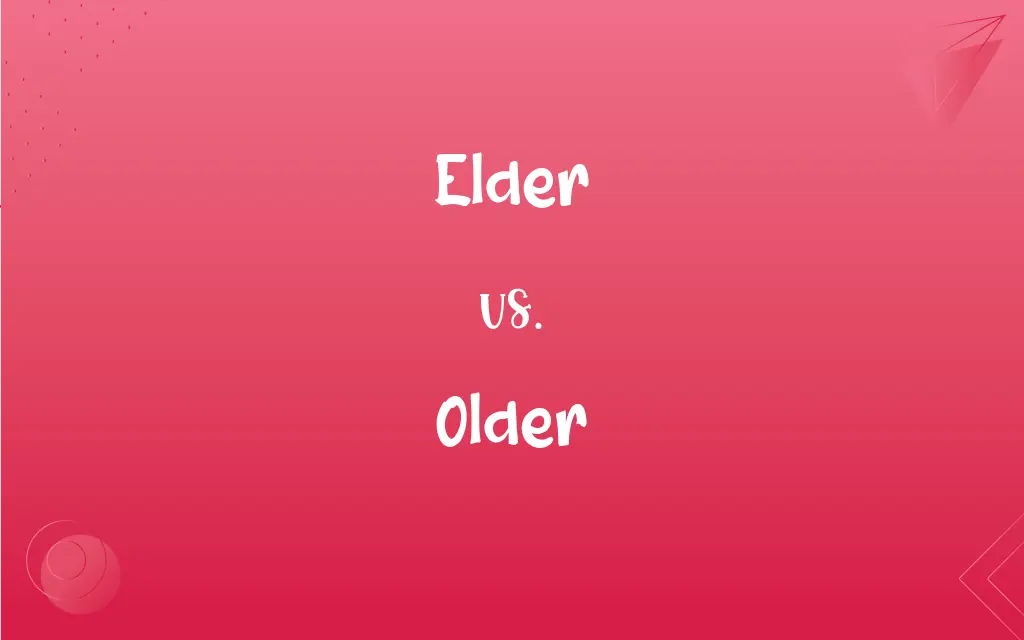Elder vs. Older: What's the Difference?
By Janet White || Published on November 22, 2023
"Elder" typically refers to a person of greater age within a specific group, often with connotations of respect, while "older" is a comparative term used to describe someone or something of greater age relative to another.

Key Differences
"Elder" is often used in a more formal or respectful context, while "older" is a general term for comparing age.
"Elder" implies a position of respect or authority, whereas "older" simply indicates age difference without such connotations.
"Elder" is used in familial and community contexts, often to denote seniority. "Older" is broadly used in all contexts for age comparison.
"Elder" has a cultural and sometimes spiritual significance, denoting wisdom and experience. "Older" lacks these cultural connotations.
"Elder" can be a noun and an adjective, while "older" is primarily an adjective, used in comparative situations.
ADVERTISEMENT
Comparison Chart
Usage
Formal, respectful
General, comparative
Connotation
Respect, authority
Simply age comparison
Context of Application
Familial, community, leadership
Any comparative age situation
Cultural Significance
Wisdom, experience, seniority
None specifically
Linguistic Role
Noun and adjective
Adjective
ADVERTISEMENT
Elder and Older Definitions
Elder
A senior figure or leader in a community.
The village elders decided the matter.
Older
Having lived for a relatively long time.
The older employees have more experience.
Elder
An older, respected member of a family.
She is the elder of two sisters.
Older
Denoting a more advanced point in time.
In older times, communication was not as easy.
Elder
A title for a senior member of a religious or other organization.
The church elder led the service.
Older
Used to compare ages in a relative sense.
He is older than his cousin by two years.
Elder
A person of greater age in a group.
He sought advice from his elder brother.
Older
Comparatively aged more than another.
My older sister is a doctor.
Elder
An adjective denoting seniority or higher rank.
He is the elder statesman of the political party.
Older
Being advanced in years.
The older model of the car is less efficient.
Elder
Greater than another in age or seniority.
Older
Having lived or existed for a relatively long time; far advanced in years or life.
Elder
(Archaic) Superior to another or others, as in rank.
Older
Relatively advanced in age
Pamela is our oldest child.
Elder
An older person.
FAQs
What does "elder" mean?
"Elder" refers to someone of greater age, often with respect to their position or role.
How is "older" used?
"Older" is used to describe someone or something as having more age compared to another.
Can "elder" be used for anyone older?
"Elder" is typically used in specific contexts, like family or community, not just for anyone older.
Is "older" a formal term?
"Older" is a neutral term and not specifically formal.
Can "elder" be a title?
Yes, "elder" can be a title in religious or community organizations.
What is an example of an "elder" in a community?
An example is a respected senior member in a village who contributes to decision-making.
Can "older" imply respect?
"Older" does not inherently carry a connotation of respect; it's purely descriptive.
Does "older" refer to old age?
"Older" refers to being more aged than another but doesn't necessarily mean old age.
Do "elder" and "older" have the same meaning?
No, "elder" has connotations of respect and position, while "older" is simply about age difference.
How is "older" used in a sentence?
"Older" is used as a comparative adjective, e.g., "She is older than her brother."
Can "elder" be used in corporate settings?
"Elder" is less common in corporate settings, being more suited to familial or community contexts.
Can "elder" imply wisdom?
"Elder" often implies wisdom or experience due to age and role.
How is "elder" used in families?
"Elder" in families refers to the older members, like elder siblings or parents.
Is "older" a relative term?
Yes, "older" is always used in a relative sense, comparing age differences.
Does "older" have cultural significance?
"Older" lacks specific cultural significance and is a general term for age comparison.
What denotes an "elder" in a group?
An "elder" in a group is often determined by age, respect, and seniority.
Can "elder" refer to ancestors?
Yes, "elder" can refer to ancestors or forebears in a respectful context.
Can "older" refer to objects?
Yes, "older" can refer to objects, indicating they are of more advanced age or version.
Is "older" used in formal writing?
"Older" can be used in both formal and informal writing for age comparison.
Is "elder" commonly used in modern language?
"Elder" is still used, especially in contexts emphasizing respect and seniority.
About Author
Written by
Janet WhiteJanet White has been an esteemed writer and blogger for Difference Wiki. Holding a Master's degree in Science and Medical Journalism from the prestigious Boston University, she has consistently demonstrated her expertise and passion for her field. When she's not immersed in her work, Janet relishes her time exercising, delving into a good book, and cherishing moments with friends and family.






































































